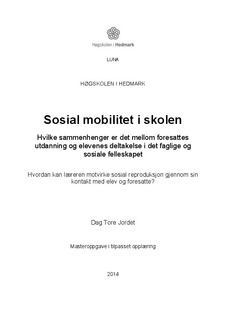Sosial mobilitet i skolen. Hvilke sammenhenger er det mellom foresattes utdanning og elevenes deltakelse i det faglige og sosial felleskapet. Hvordan kan læreren motvirke sosial reproduksjon gjennom sin kontakt med elev og foresatte?
Master thesis

Åpne
Permanent lenke
http://hdl.handle.net/11250/224727Utgivelsesdato
2014Metadata
Vis full innførselSammendrag
Norsk:
Denne masteroppgaven er skrevet under masterstudiet i tilpasset opplæring ved Høgskolen i
Hedmark. Egne forskningsfunn bygger på SPEED (The Function of Special Education) -
undersøkelsen som er et samarbeid mellom høgskolene i Hedmark og Volda der elever fra 5.–
9. trinn blir kartlagt. Fokuset er spesialundervisning, men materialet som bygger på besvarte
spørreskjema fra ca. 3500 elever, samt foreldre, assistenter og lærere fra Lillehammer og
Ålesund, danner også grunnlag for å se etter andre sammenhenger. I dette datamaterialet har
jeg lett etter mulige årsaker til lav sosial mobilitet.
Norsk skole har hatt et ønske om å bygge ned tersklene for sosial mobilitet, uten å lykkes i
stor grad. En direkte årsak til lav sosial mobilitet kommer av større frafall i videregående av
elever med foresatte som har lav utdannelse. Av elevene som ikke fullfører videregående
skole på normert tid har en stor del svakere faglige resultater allerede både ved avslutningen
av 10. trinn og fra inngangen til ungdomskolen. Her viser utviklingen at ulikheter i
skolekarakterer på bakgrunn av foresattes utdanningsnivå var noe større i de første årene etter
innføringen av kunnskapsløftet enn i årene før (Bakken, 2012, s. 26). Det må derfor letes etter
mulige årsaker under hele grunnskoleløpet.
Oppgaven min er delt opp i to deler, en analyse- og drøftingsdel og en tiltaksdel. Første del,
analyse- og drøftingsdelen, utgjør hoveddelen i oppgaven og søker etter svar på den primære
problemstillingen: Hvilke sammenhenger er det mellom foresattes utdanning og elevens
deltakelse i det faglige og sosiale fellesskapet?
I første del har jeg sett på hvordan teoriene til Michel Foucault, Pierre Bourdieu og Axel
Honneth kan tolkes i forhold til den primære problemstillingen. Disse teoriene bruker jeg som
bakgrunn for tolkning og drøfting av funnene i undersøkelsesdelen.
I undersøkelsesdelen sammenligner jeg forskjellige faktorer med mors utdanningsnivå. I den
påfølgende drøftingen analyserer jeg funnene ut fra teorier av Foucault, Bourdieu og Honneth
som omhandler klasse, diskurs og forskjellige former for kapital og anerkjennelse. I oppgavas
andre del blir teoriene og tolkning av funnene forsøkt og satt inn i en undervisningshverdag
for å se hvordan mine funn og mulige sammenhenger kan omsettes i virkningsfulle tiltak.
Disse tiltakene er et svar på den sekundære problemstillingen; hvordan kan læreren motvirke
sosial reproduksjon gjennom sin kontakt med elev og foresatte? English:
This thesis is written under the master's program in Adapted Needs Education at Hedmark
University College. Individual research findings based on the SPEED (The Function of
Special Education), survey, - a collaboration between colleges in Hedmark and Volda where
students from grades five to nine are mapped. The focus is on special education, but the
material based on questionnaires from about. 3500 pupils and parents, assistants and teachers
from Lillehammer and Ålesund, forms the basis to look for other correlations. In these data, I
have looked for possible causes of low social mobility.
Norwegian schools have attempted to reduce the thresholds for social mobility, without great
success. A direct cause of low social mobility is the higher dropout rate in secondary school
students with parents who have low education. Students who do not complete high school at
the normal time have weaker academic performance both at the end of 10th grade and at the
start of secondary school. It shows the trend that differences in grades on the basis of parental
education was somewhat greater in the first years after the introduction of the national
curriculum “Kunnskapsløftet,” than the year before (Bakken, 2012, p 26). It is therefore
necessary to attempt to identify possible causes during both primary and lower secondary
education.
My paper is divided into two parts, an analysis and discussion and an initiative section. The
first part, constitutes the bulk of the thesis and searches for answers to the primary research
question: What are the connections between parental education and student participation in
academic and social communities?
In the first part, I see how the theories of Michel Foucault, Pierre Bourdieu and Axel Honneth
can be interpreted in relation to the primary issue. These theories are used as a background for
interpretation and discussion of findings in the study section.
In the survey section I compare different factors with maternal education levels. In the
ensuing discussion, I analyze the findings from the theories of Foucault, Bourdieu and
Honneth concerning class, discourse and various forms of capital and recognition. In the
second part theories and interpretations of findings are tried and put into the classroom to see
how my findings and possible connections can be translated into effective action. These
measures are a response to the secondary research question; how can the teacher counteract
social reproduction through their contact with pupils and parents or guardians?
Beskrivelse
Mastergradsoppgave i tilpasset opplæring, Avdeling for lærerutdanning og naturvitenskap, Høgskolen i Hedmark, 2014.